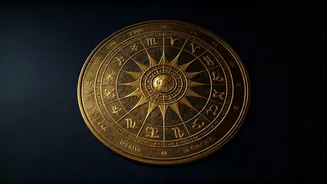Origins of Astrology
Astrology's roots are ancient, stretching back thousands of years. It emerged from early civilizations who observed celestial movements and linked them
to earthly events. The Babylonians, Egyptians, and Greeks are particularly known for developing complex astrological systems. These early astrologers believed the positions of the sun, moon, and planets at the time of a person's birth significantly shaped their personality and destiny. They developed detailed charts, called birth charts or natal charts, that provided snapshots of the celestial influences at a specific time and location. These charts were used to predict future events, guide decisions, and understand the self. Over time, astrology spread across various cultures, evolving and adapting to local beliefs and practices. It was often intertwined with religious and philosophical ideas, influencing art, literature, and social structures. Even today, astrological traditions have endured, with new research and evolving interpretive techniques continually shaping the art.
Core Astrological Concepts
Understanding astrology requires grasping several key concepts. The zodiac, a band of constellations along the ecliptic (the sun's path), is divided into twelve signs, each representing different personality traits and life experiences. Each sign corresponds to a specific period of the year. The planets, including the sun and moon, represent different aspects of the self and have particular influences. For example, the sun is associated with identity and ego, while the moon represents emotions and instincts. The houses, or divisions of the birth chart, symbolize different areas of life, such as relationships, career, and health. The angles between planets (aspects) show how they interact with each other, affecting the harmony or conflict within a person's life. Astrologers analyze these elements to build a comprehensive picture. Combining the planets' positions in the signs and houses, along with their aspects, helps to give unique insights into a person's traits, strengths, and weaknesses.
Astrology's Practical Uses
Astrology offers a variety of practical applications, from self-discovery to relationship guidance. Birth charts can reveal personality traits, talents, and potential challenges. Understanding your birth chart can provide insights into your unique strengths and areas where you may need to develop or grow. The study of synastry (the comparison of two birth charts) is often used to assess relationship compatibility. Astrologers analyze how the planets in one person's chart interact with the planets in another, giving hints on areas of connection and potential conflict. In addition, astrology is sometimes used for career guidance, assisting individuals in identifying suitable fields based on their chart's planetary placements. Astrological forecasts provide insights into upcoming events and trends. These forecasts can help you prepare for challenges and harness opportunities, providing timing advice. Although astrology is not a precise science, it provides a means for gaining insights into one's life's major patterns and possibilities.
Types of Astrology
Different forms of astrology are used worldwide. Natal astrology, which is based on an individual's birth chart, is a cornerstone of the practice. Horary astrology, on the other hand, answers specific questions, such as whether a lost item will be found. The astrologer casts a chart for the time when the question is posed, allowing the astrologer to derive insights into the question. Mundane astrology analyzes planetary movements to provide insights into global events. Each of these astrological techniques uses different methods to evaluate and interpret charts. Other astrological branches, such as medical astrology, connect planetary influences with health and well-being. Indian (Vedic) astrology, a complex system, focuses on lunar mansions and sidereal zodiac. All these diverse approaches use core astrological principles but have distinctive methods and focus areas, offering various perspectives to individuals seeking understanding.
Is Astrology Accurate?
The question of astrology's accuracy sparks much debate. Astrology has been criticized due to a lack of scientific validation. Critics often point out the lack of concrete, repeatable results when tested under controlled circumstances. Many argue that astrological interpretations can be very broad, making it easy to find them fitting to many people. Proponents of astrology often counter that the system is better understood as a symbolic language or framework. Astrologers claim that astrology is about gaining self-awareness and understanding life's events. While astrology may not offer predictions, it can give insights and perspectives that help one make choices. Whether astrology is regarded as accurate depends on the observer's viewpoint and criteria for proof. Many people have found astrology helpful. It offers a framework for self-exploration and understanding.





















